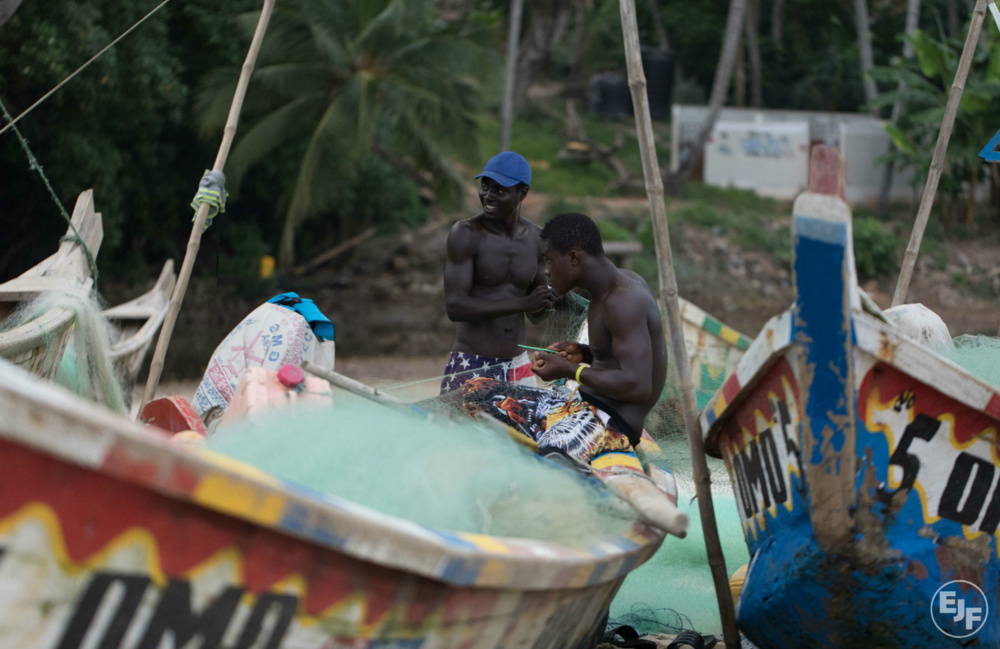
Positive developments for Ghana’s struggling fishing industry
Ghana marked a turning point this month towards implementing the global guidelines on fair tenure rights, to save the country’s declining fishing industry and safeguard national food security.
A meeting organised by the Environmental Justice Foundation (EJF), Hen Mpoano and the UN Food and Agriculture Organization (FAO), ended with firm recognition that the core principles of the international guidelines must be implemented to save the country’s declining fishing industry and help restore healthy oceans.
Ghana’s fisheries are in steep decline, with landings of key species for local consumption at their lowest recorded level since 1980.
Traditional fishing communities have been hit hardest, with average annual income per canoe dropping by as much as 40% in the last 10 to 15 years.
Small-scale fishers are suffering due to coastal development in areas where they usually land their catch, and because of encroachment by offshore oil development into traditional fishing grounds. The illegal and destructive practices of industrial fishing vessels, at times in areas reserved for small-scale fishers, have further infringed on their rights, adding to the problems.
Rights of access to land, fish stocks and forests are not always guaranteed. Local communities around the world often have effective systems to decide how access is granted to use and control these resources, and the responsibilities that come with such ‘tenure rights’. However, these systems are often informal, and not enshrined in the law.
As times change and conflicts arise, there is the potential that those with the least power will have their rights eroded. In Ghana, this represents a real threat to national food security. The meeting, which brought together all levels of decision makers, from traditional authorities, to local and national government, was held to discuss how the voluntary guidelines could inform law making in Ghana to save the future of fishing communities and the ecosystems they depend on.
EJF’s Executive Director, Steve Trent, said:
“Trawlers illegally target small pelagic species such as sardinella, the primary catch of canoe fishers, before transferring the catches to smaller boats at sea to evade oversight of the authorities. Known locally as ‘saiko’, this activity infringes upon tenure rights and severely undermines sustainable fisheries management.”
After wide-ranging discussions, the meeting ended with a firm recognition that the Voluntary Guidelines on the Responsible Governance of Tenure (VGGT) and the Voluntary Guidelines for Securing Small-Scale Fisheries (SSF Guidelines) should be implemented to secure the rights of small-scale fishers and safeguard food security.
Recognition and respect for all forms of legitimate tenure rights in Ghana – whether or not formally recorded – is urgently needed. The VGGT and sister SSF Guidelines together represent a unique step towards this.
With these reforms, Ghana has an opportunity to demonstrate leadership in dealing with the complex issues of small-scale fisheries governance and tenure rights, which are being played out, not just in Ghana, but across the world.
Securing sustainable fisheries in Ghana
Between 2017 and 2019, EJF will work with local partner Hen Mpoano to improve the lives of fishers and promote food security across Ghana. We’ll work with almost 60 communities across 10 coastal districts in Ghana’s Central Region and in the Volta Estuary in a bid to safeguard marine resources for current and future generations of local fishers.
We’ll aim to empower local communities to take a stand against illegal fishing activities, providing the much needed evidence for the government to take action against these illicit practices; train local fisherman to understand and protect their rights in fisheries management; promote the fair allocation of tenure rights to protect small-scale fisheries from the encroachment of tourism and other industrial activities; and identify and promote alternative livelihoods to help broaden fisher communities’ economic basis and support the long term sustainability of Ghana’s fish stocks.
Watch the film from EJF and Hen Mpoano: Ghana’s Fishing Sector and the Voluntary Guidelines on Governance of Tenure.
SIGN UP FOR OUR EMAILS AND STAY UP TO DATE WITH EJF